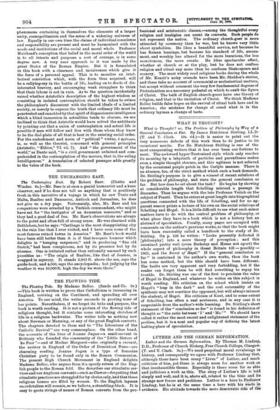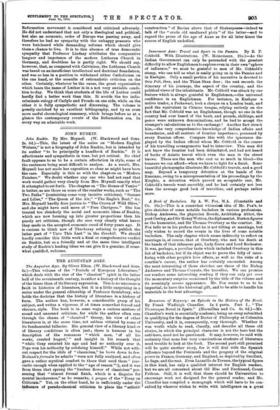LUTHER. AND THE GERMAN REFORMATION.
Luther and the German. Reformation. By Thomas M. Lindsay, D.D., Professor of Church History, Free Church College, Glasgow. (T. and T. Clark. 3s.)—We need perpetual moral revaluings in history, and consequently we agree with Professor Lindsay that, although there have been many "Lives" of Luther, and much criticism of him, yet there is always room for another work on that inexhaustible theme. Especially is there room for so able and judicious a work as this. The story of Luther's life is told simply and well, and it is, above all, related to the time and its strange new forces and problems. Luther is a hero to Professor Lindsay, but he is at the same time a hero with his warts in evidence. His attitude towards the more democratic side of the
Reformation movement is considered and criticised adversely. He did not understand that not only a theological and political, but also an economic, order of Europe was passing away, and therefore he had no sympathy with the unhappy peasants who were butchered while demanding reforms which should give them a chance to live. It is to this absence of true democratic sympathy that Professor Lindsay attributes the comparative languor and impotence of the modern Lutheran Church in Germany, and doubtless he is partly right. We should say, however, that, as compared with Calvinism, the Lutheran Church was based on an insufficient intellectual and doctrinal foundation, and was so less in a position to withstand either Catholicism on the one hand, or the assaults of rationalistic criticism on the other. Certainly, whatever be the cause, the great organisation which bears the name of Luther is in a not very enviable condi- tion to-day. We think that students of the life of Luther could hardly find a better work than this. It avoids the too indis- criminate eulogy of Carlyle and Fronde on one side, while on the other it is fully sympathetic and discerning. The volume is greatly enriched by an excellent bibliography, and by an even more useful chronological summary, which brings before us at a glance the contemporary events of the Reformation era. In every way an admirable work.



















































 Previous page
Previous page